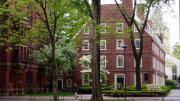The National Labor Relations Board (NLRB) will publish a proposed rule on Monday that would exempt university students who conduct paid teaching and research from the right to form a labor union, a right guaranteed to most other private-sector workers. If approved, it would be the fourth time since 2000 that the federal agency has flipped its position on graduate-student unionization, and would mean that private universities are no longer required to bargain with student unions. The rule could have wide-ranging consequences for private universities where grad students have already formed unions, including Harvard—where the union and the University are in protracted negotiations over an initial contract.
Harvard graduate students voted to form union in April 2018, after building support through a years-long organizing drive. A 2016 NLRB decision had ruled that private university graduate students were employees and thus entitled to collective bargaining rights, which meant that their employers had to recognize and bargain with democratically elected unions. According to the NLRB’s proposed view announced today, which would in effect reverse the 2016 decision, “students who perform services—including teaching and/or research—for compensation at a private college or university in connection with their studies are not ‘employees’” under the National Labor Relations Act.
After the 2018 election, Harvard announced it would bargain with the Harvard Graduate Student Union-UAW (HGSU-UAW), and the two parties have been negotiating over an initial contract since last fall. Now, after today’s NLRB announcement, University spokesman Jonathan Swain said, “We are reviewing the proposed rule to assess what implications it may have on the University’s ongoing negotiations with the Harvard Graduate Student Union-UAW.”
“This proposed rulemaking by the Trump NLRB is a naked attempt to crush our growing movement,” HGSU-UAW tweeted this morning. “But it won’t stop us from fighting for a fair contract, and it won’t stop the thousands of student workers who are organizing across the country.”
“In the past 19 years, the Board has changed its stance on this issue three times,” NLRB chairman John Ring, who was appointed in 2018 by President Donald Trump, said in a news release. “This rulemaking is intended to obtain maximum input on this issue from the public, and then to bring stability to this important area of federal labor law.” Members of the public are invited to make comments on the proposal for 60 days after its publication.









